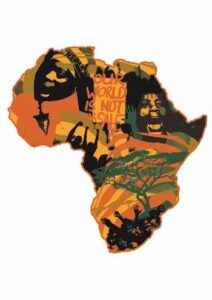
*On this date in 1896, we celebrate Pan-Africanism. This Black African worldwide movement aims to encourage and strengthen bonds between all Indigenous and diaspora peoples of African ancestry.
This article's date and year parallel the battle of Adwa, a response to the Berlin Conference assault, which was chosen as a meaningful episode in Pan-Africanism. Based on a common goal dating back to the middle passage, the movement extends beyond the continent with support from the African diaspora in the Americas and Europe.
As a philosophy, Pan-Africanism represents the collection of Africans' historical, cultural, spiritual, artistic, scientific, and philosophical legacies from the past to the present. Pan-Africanism, as an ethical system, traces its origins from ancient times and promotes values that are the product of African civilizations and the struggles against slavery, racism, colonialism, and neocolonialism. Pan-Africanism can be said to have its origins in the efforts of the African people against enslavement and colonization and may trace this struggle back to the first resistance on slave ships—rebellions and suicides—through the constant plantation and colonial uprisings and the "Back to Africa" movements of the 19th century.
Based on the belief that unity is vital to economic, social, and political progress and aims to "unify and uplift" people of African ancestry. Coinciding with the Haitian Revolution and other New World slave insurrections, the end of the 19th century birthed an intercontinental pro-African political movement that sought to unify disparate campaigns to end oppression. Another important political form of a religious pan-Africanist worldview appeared in the form of Ethiopianism.
In London, the Sons of Africa was a political group addressed by Quobna Ottobah Cugoano in the 1791 edition of his book Thoughts and Sentiments on the Evil of Slavery. The group addressed meetings, organized letter-writing campaigns, published campaigning material, and visited parliament. They wrote to figures such as Granville Sharp, William Pitt, and other white European abolition movement members, King George III, and the Prince of Wales, the future George IV. Modern Pan-Africanism began around the start of the 20th century.
The African Association, later renamed the Pan-African Association, was established around 1897 by Henry Sylvester Williams, who organized the First Pan-African Conference in London in 1900. At its core, Pan-Africanism is a belief that "African people, both on the continent and in the diaspora, share a common history and a common destiny." Pan-Africanist intellectual, cultural, and political movements view all Black Africans and descendants of Africans as belonging to a single "race" or otherwise sharing cultural unity. Pan-Africanism advances a sense of a shared historical fate for Africans in America, the West Indies, and on the continent.
It centers on the Atlantic trade in slaves, African slavery, and European imperialism. Pan-African thought influenced the establishment of the Organization of African Unity (since succeeded by the African Union) in 1963. The African Union Commission has its seat in Addis Ababa, and the Pan-African Parliament has its headquarters in Midrand, Johannesburg.